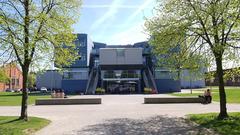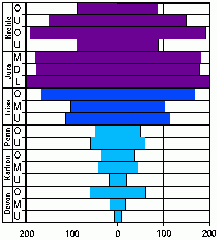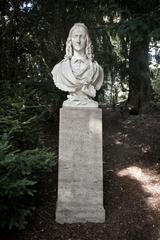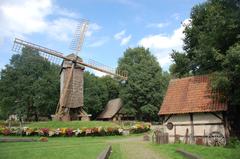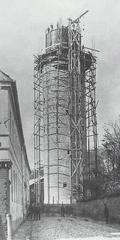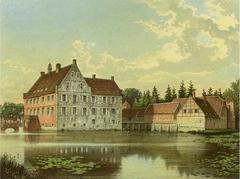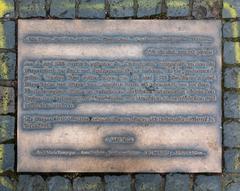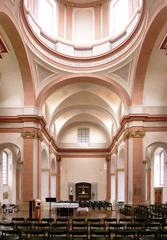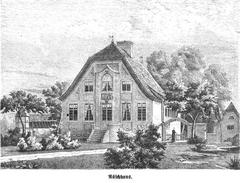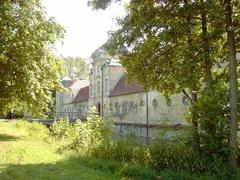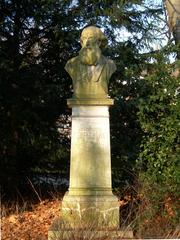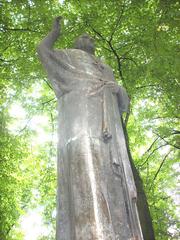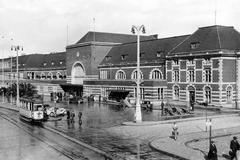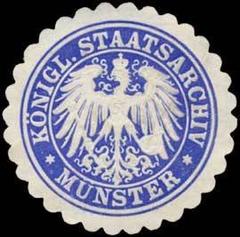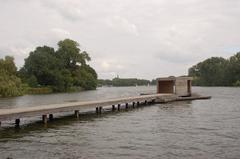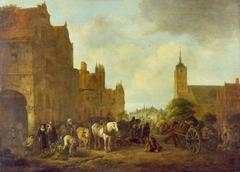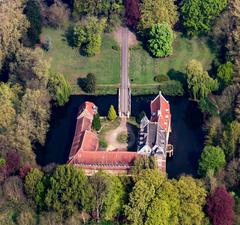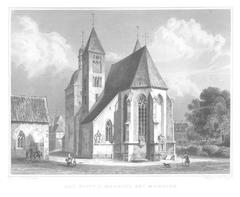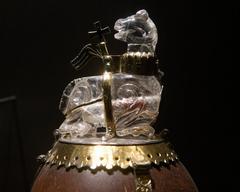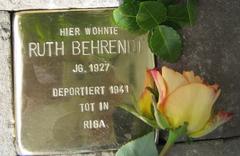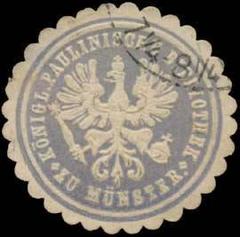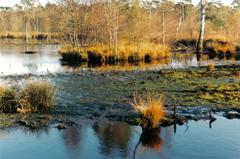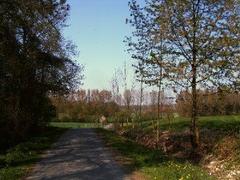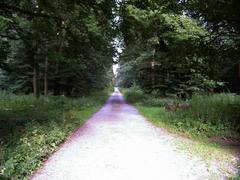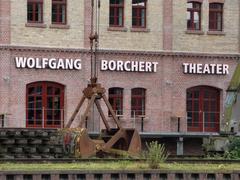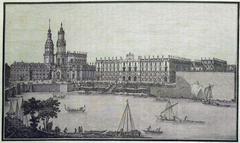Baumberger Sandsteinmuseum Visitor Guide: Hours, Tickets, and Attractions in Münster
Date: 17/08/2024
Introduction
Nestled in the charming town of Havixbeck near Münster, Germany, the Baumberger Sandsteinmuseum stands as a tribute to the region’s renowned Baumberger sandstone. This fine-grained yellow limestone sandstone, often dubbed the ‘marble of Münsterland,’ has played a pivotal role in shaping the architectural and cultural heritage of Northern Germany and beyond. Established in 1994, the museum is housed in a historic, listed former farmhouse, offering visitors a unique journey through time. From its geological origins to its extensive use in medieval architecture, Baumberger sandstone has left an indelible mark on the region, with notable structures like the Münster Cathedral showcasing its significance (Baumberger Sandsteinmuseum).
The museum’s exhibits are meticulously curated to provide a comprehensive understanding of Baumberger sandstone. Visitors can explore the stone’s geological formation, its extraction processes, and its applications in architecture and sculpture. The museum also features interactive displays, special exhibitions, and educational programs, making it a dynamic destination for history enthusiasts, architecture lovers, and curious travelers alike (Baumberger Sandsteinmuseum). This guide aims to provide all the essential information for a memorable visit, including historical insights, visitor details, and travel tips.
Table of Contents
- [Explore Baumberger Sandsteinmuseum: History, Tickets, and Visitor Information](#explore-baumberger-sandsteinmuseum-history-tickets-and-visitor-informationexplore-baumberger-sandsteinmuseum-history-tickets-and-visitor-information)
- [Introduction](#introductionintroduction)
- [History and Significance](#history-and-significancehistory-and-significance)
- [Origins and Historical Context](#origins-and-historical-contextorigins-and-historical-context)
- [Medieval Significance](#medieval-significancemedieval-significance)
- [Architectural Influence](#architectural-influencearchitectural-influence)
- [Export and Usage](#export-and-usageexport-and-usage)
- [Museum Exhibits and Artifacts](#museum-exhibits-and-artifactsmuseum-exhibits-and-artifacts)
- [Fossils and Geological Insights](#fossils-and-geological-insightsfossils-and-geological-insights)
- [Special Exhibitions and Events](#special-exhibitions-and-eventsspecial-exhibitions-and-events)
- [Visitor Information](#visitor-informationvisitor-information)
- [Opening Hours](#opening-hoursopening-hours)
- [Ticket Prices](#ticket-pricesticket-prices)
- [Accessibility](#accessibilityaccessibility)
- [Nearby Attractions](#nearby-attractionsnearby-attractions)
- [Educational and Cultural Impact](#educational-and-cultural-impacteducational-and-cultural-impact)
- [Preservation and Conservation](#preservation-and-conservationpreservation-and-conservation)
- [Visitor Experience](#visitor-experiencevisitor-experience)
- [Frequently Asked Questions](#frequently-asked-questionsfrequently-asked-questions)
- [Conclusion](#conclusionconclusion)
- [Visit and Stay Up to Date](#visit-and-stay-up-to-datevisit-and-stay-up-to-date)
Explore Baumberger Sandsteinmuseum: History, Tickets, and Visitor Information
Introduction
Nestled in the picturesque town of Havixbeck near Münster, Germany, the Baumberger Sandsteinmuseum is a hidden gem dedicated to the region’s renowned fine-grained yellow Baumberger sandstone. Known for its rich history and cultural significance, this museum offers visitors a unique glimpse into the architectural and artistic heritage of Münsterland. Whether you’re a history enthusiast, an architecture lover, or simply curious about local attractions, this guide provides comprehensive information on visiting the Baumberger Sandsteinmuseum, including its history, exhibits, visiting hours, ticket prices, and more.
History and Significance
Origins and Historical Context
The Baumberger Sandsteinmuseum, established in 1994, is a municipal museum of the Havixbeck community, led by historian Joachim Eichler. This museum is dedicated to Baumberger sandstone, a unique type of limestone sandstone mined in the nearby Baumberger mountains for over a millennium.
Medieval Significance
During the Middle Ages, Baumberger sandstone, often referred to as the “marble of Münsterland,” was extensively used across Northern Germany, the Netherlands, the Baltic States, and even as far as Southern Sweden. Notably, the Münster Cathedral was built using this sandstone, highlighting its importance in medieval architecture.
Architectural Influence
Baumberger sandstone has left an indelible mark on the architectural landscape of Münsterland. Numerous historical buildings, townhouses, and wayside shrines in the region still shine in the characteristic color of this sandstone. Its fine-grained and soft texture makes it an ideal material for sculptors.
Export and Usage
The export of Baumberger sandstone extended beyond the local region, reaching Scandinavia and the Baltic States. It was a popular building material used in the construction of cathedrals in Aachen and Hildesheim, and even the world-famous Cologne Cathedral incorporated this sandstone in its structure.
Museum Exhibits and Artifacts
The Baumberger Sandsteinmuseum offers a comprehensive look into the history and significance of Baumberger sandstone. The museum’s permanent exhibition, housed in a listed former farmhouse, showcases a variety of tools, typical sandstone products, and historical stone sculptures. Visitors can gain insights into the everyday work of stonemasons during the Middle Ages, understanding the craftsmanship and artistry involved in working with this unique material.
Fossils and Geological Insights
Fossils embedded in Baumberger sandstone provide valuable information about the stone’s origin and geological history. These fossils are part of the museum’s exhibits, offering visitors a glimpse into the ancient past and the natural processes that formed this remarkable stone.
Special Exhibitions and Events
In addition to its permanent collection, the Baumberger Sandsteinmuseum hosts special exhibitions and events. The former hayloft of the farmhouse provides an ideal setting for these temporary displays, which often include concerts and other cultural activities. This dynamic aspect of the museum ensures that there is always something new and exciting for visitors to experience.
Visitor Information
Opening Hours
The museum is open from Wednesday to Sunday, with special public tours available on Sundays and holidays from March 31 to October 3. These tours provide a personal explanation of the museum’s exhibits, enhancing the overall visitor experience.
Ticket Prices
The ticket prices for visiting the Baumberger Sandsteinmuseum are as follows:
- Adults: €5
- Children (12 and under): Free
- Group discounts and guided tour prices are available upon request.
Accessibility
The museum is wheelchair accessible, and facilities are available to ensure a comfortable visit for all guests. Guided tours can be tailored to accommodate visitors with special needs.
Nearby Attractions
While visiting the Baumberger Sandsteinmuseum, you can also explore other historical sites in Havixbeck, such as the picturesque Burg Hülshoff and the charming town center, which offers a variety of shops and restaurants.
Educational and Cultural Impact
The museum plays a crucial role in educating the public about the historical and cultural significance of Baumberger sandstone. It offers guided tours that make the visit more informative and entertaining, catering to both adults and children aged 12 and above. These tours provide an in-depth understanding of the stone’s history, its processing, and the lives of the stonemasons who worked with it.
Preservation and Conservation
The Baumberger Sandsteinmuseum is not just a repository of historical artifacts but also a center for the preservation and conservation of Baumberger sandstone. The museum’s efforts ensure that this unique material and the skills associated with its use are passed down to future generations. This commitment to preservation is evident in the museum’s meticulous curation of its exhibits and its ongoing educational programs.
Visitor Experience
Visitors to the Baumberger Sandsteinmuseum can expect a rich and immersive experience. The museum shop offers small sandstone works for purchase, allowing visitors to take a piece of this historical material home with them. Additionally, the museum’s serene setting provides ample photographic opportunities, making it a perfect spot for capturing memories.
Frequently Asked Questions
Q: What are the Baumberger Sandsteinmuseum visiting hours? A: The museum is open from Wednesday to Sunday, with special public tours available on Sundays and holidays from March 31 to October 3.
Q: How much do tickets to the Baumberger Sandsteinmuseum cost? A: Adults: €5, Children (12 and under): Free. Group discounts and guided tour prices are available upon request.
Q: Is the Baumberger Sandsteinmuseum accessible for visitors with disabilities? A: Yes, the museum is wheelchair accessible, and facilities are available to ensure a comfortable visit for all guests.
Conclusion
The Baumberger Sandsteinmuseum stands as a testament to the historical and cultural significance of Baumberger sandstone. Through its extensive exhibits, educational programs, and special events, the museum offers a comprehensive understanding of this unique material and its impact on the region’s architectural and artistic heritage. Visitors to the museum can expect an enriching experience that highlights the craftsmanship, history, and enduring legacy of Baumberger sandstone. For more information, visit the official website of the Baumberger Sandsteinmuseum.
Visit and Stay Up to Date
Don’t miss out on discovering more about Baumberger sandstone and other historical treasures. Follow us on social media to stay updated on upcoming events and special exhibitions. Plan your visit today and immerse yourself in the rich history of Havixbeck!
References
- Baumberger Sandsteinmuseum. (n.d.). Retrieved from Baumberger Sandsteinmuseum
- Baumberger Sandsteinmuseum. (n.d.). Entstehung. Retrieved from Baumberger Sandsteinmuseum
- Münster Tourism. (n.d.). Retrieved from Münster Tourism
